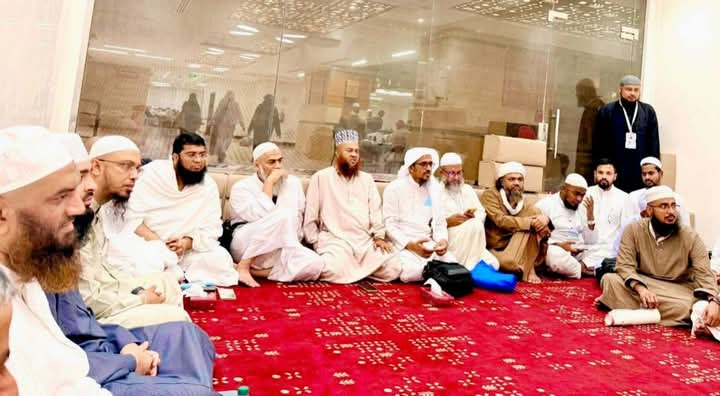Nearly two dozen radical Islamist speakers, scholars and extremist leaders, who have been patronised by the Jamaat-controlled Yunus-led interim government, have held a secret meeting in Saudi Arabia under the guise of performing Hajj.
Recently, most of these extremist groups participated in the demonstrations against the women’s affairs reform commission. They marched to support Gaza, demand a ban on the Awami League, and call for the release of Jamaat leader ATM Azharul Islam, who is also a 1971 war criminal.
The attendees include LeT follower Harun Izhar, Jamaat leader Masood Sayedee, Mizanur Rahman Azhari, and Kazi Ibrahim, Ahle Hadith leaders Muzaffar Bin Muhsin and Ahmadullah, and Hefazat leader Mamunul Haque.

Some other leaders were Muhammad Hasan Jamil, Mustakunnabi Kasemi, Khalid Saifullah Aiyubi, Gias Uddin Talukder, Mokhter Ahmad, Md Abul Kalam Azad, Kamrul Islam Sayed Ansari, Abdul Hi Muhammad Saifullah, Rezaul Karim Abdrar, Shamsuddoha Ashrafi and Mostaq Foyezi.
The meeting is significant as the interim government is under pressure from the army and the BNP to hold elections by December.
Since August, these extremist elements have been promoting jihad against the Arakan Army, India and Israel amid tension between the governments of Muhammad Yunus and Narendra Modi, on the Rakhine corridor, and Chittagong Port management.
Viewed as anti-Awami League, anti-secular and anti-India, these extremists earlier held several meetings among small groups to establish a combined platform ahead of the next elections.
Their presence is seen on the ground, usually under the banner of Touhidi Janata, while enforcing stricter Islamist rules.
Religious Affairs Adviser AFM Khalid Hossain, Law Adviser and ISI agent Asif Nazrul and Industries Adviser Adilur Rahman Khan are seen as sympathisers of the radical Islamists.
Khalid Hossain was previously a leader of Qawmi madrasa-based platform Hefazat and Islami Andolan Bangladesh of Chormonai Pir.
Sources said the meeting in Saudi Arabia was held on Sunday to forge a unity when the Pakistan-based militant groups, including Lashkar-e-Tayyiba (LeT) and Jamaat-ut-Dawa, are extending all-out support to establish a Shariah-based system in Bangladesh.
These Pakistani jihadists groups have recently boasted that their leaders and fighters participated in the July-August riots to unseat the Awami League government.
They represent Jamaat-e-Islami, Hefazat-e-Islami, Bangladesh Khelafat Majlish, Ahle Hadith, Hizb ut-Tahrir, Jama’atul Mujahideen Bangladesh (JMB), Harkatul Jihad al-Islami Bangladesh (HuJI-B), Jama’atul Ansar Fil Hindal Sharqiya, and Arakan Rohingya Salvation Army (ARSA).
These groups are responsible for conducting thousands of militant attacks since the ’90s, including the terror attack on the Pohela Boishakh celebrations in 2000, the Awami League rally on August 21, 2004, the Gulshan Holey Artisan Bakery attack in 2016, and the murder of writers and bloggers promoting war crimes trials and secularism.
After the fall of the Awami League government, many leaders of these extremist groups admitted their involvement in street violence, police murders and destruction of statues and symbols of the 1971 Liberation War, Bangabandhu, and Bangali culture.
The country also saw student demonstrations in Dhaka and outside holding Kalema flags, which were organised by Hizb ut-Tahrir.